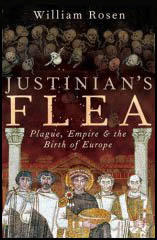Spartacus Review
Volume 16: 10th April, 2008
Ancient History

Title: Justinian's Flea: Plague, Empire and the Birth of Europe
Author: William Rosen
Editor:
Publisher: Pimlico
Price: £12.99
Bookshop: Amazon
Spartacus Website: The Ancient World
Category:
In the middle of the sixth century, the world's smallest organism collided with the world's mightiest empire. With the death of twenty-five million people, the Roman Empire, under her last great emperor, Justinian, was decimated. Before Yersinia pestis, the bacterium that carries bubonic plague, was finished, both the Roman and Persian empires were easy pickings for the armies of Muhammad on their conquering march out of Arabia. In its wake, the plague - history's first pandemic - marked the transition from the age of Mediterranean empires to the age of European nation-states - from antiquity to the medieval world. "Justinian's Flea" is the story of that collision, a narrative history that weaves together evolutionary microbiology, architecture, military history, geography, rat and flea ecology, jurisprudence, theology, epidemiology, and the economics of the silk trade.The climax of "Justinian's Flea" - the summer of 542, when Constantinople witnessed the death of 5,000 of its citizens every day - is revealed through the experiences of the remarkable individuals whose lives are a window onto a remarkable age: Justinian himself, of course, but also his general Belisarius, the greatest soldier between Caesar and Saladin, whose conquests marked the end of imperial rule in Italy and Africa; his architect, Anthemius, the mathematician-engineer who built Constantinople's Hagia Sophia (and whose brother, Alexander, was the great physician of the plague years); Tribonian, the jurist who created the Justinianic Code, the source of Europe's tradition of Civil Law; and, finally, his empress Theodora, the one-time prostitute who became co-ruler of the empire, the most politically powerful woman in European history until Elizabeth I.
